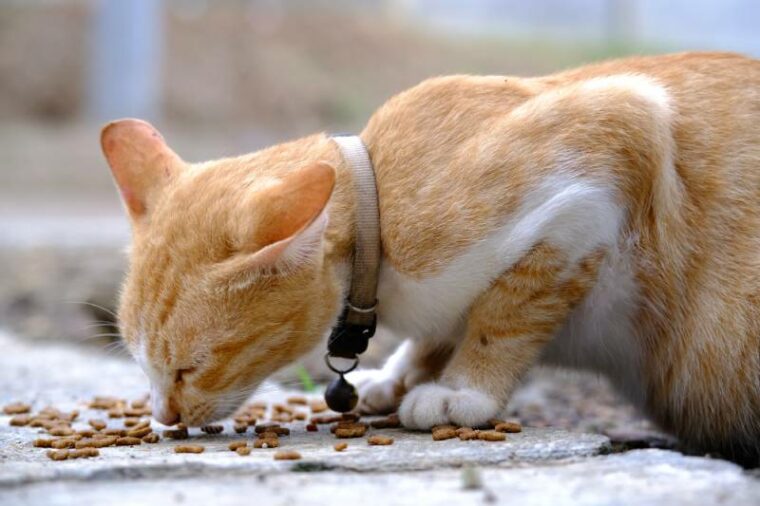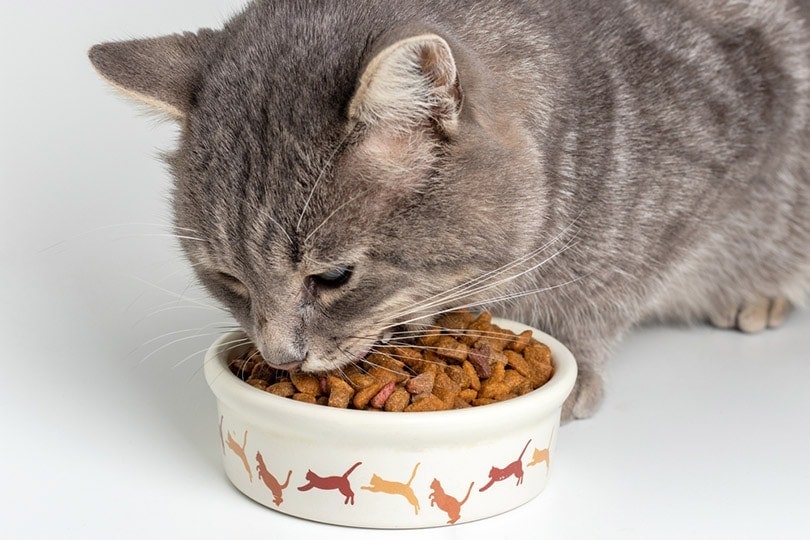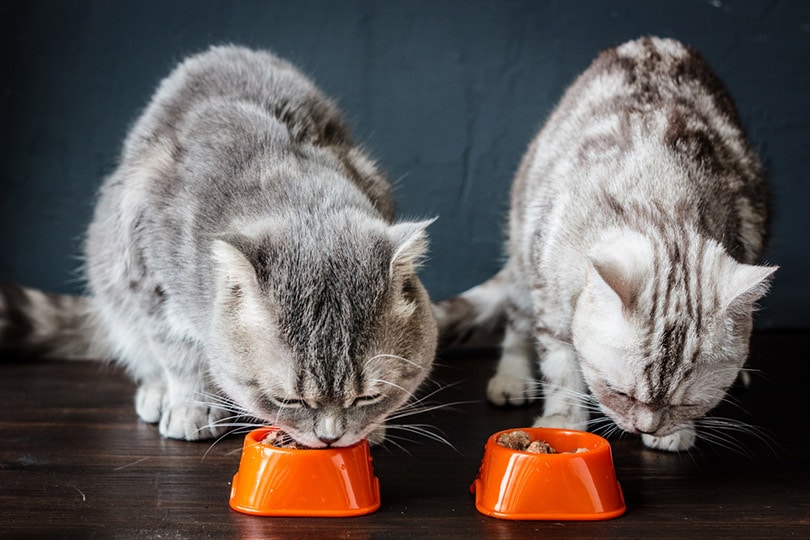
Click to Skip Ahead
Cats have no problem telling us what they want, especially at mealtimes. Every cat owner is familiar with the rubbing of the face on the legs or the constant meowing at the food dish. Sometimes, cats get worked up enough to cause them to eat too fast, which typically results in undigested food on the floor!
If your cat is eating too fast and discarding regurgitated, undigested food onto the floor, you’ll want to find ways to slow his eating down to prevent your cat from leaving his food dish still hungry. Your cat requires daily nutrients, and if he doesn’t receive enough daily, he could become ill.
If you’ve wondered why your cat eats so fast and need ways to help slow it down, we’re here to help. Let’s take a look at ways you can help your kitty to stop eating so fast.
Before You Start
The first step should be to assess why your cat is regurgitating his food. Is it because he is eating too fast, or could it be a specific food, such as a particular treat he eats that usually ends in regurgitation? Dry kibble absorbs water when your cat ingests it, which then swells and sends a message to the brain that the cat has overeaten. In that case, the body’s solution is to regurgitate the food to let some out. If it seems he regurgitates after treats, you may want to switch brands. If he regurgitates after eating dry kibble, wet canned food may be in order. You can experiment to see what may be the culprit, and it’s best to seek your veterinarian’s advice before switching food.
Regurgitating is different from vomiting; regurgitation is the mechanism triggered when your cat eats too much or too fast, resulting in undigested contents expelled through the esophagus. Vomiting will produce digested food expelled from the stomach. If your cat regurgitates often and weight loss is involved, take your cat to the vet for an examination.

The 4 Methods to Slow Down a Cat Who Is Eating Too Fast
1. Add an Obstacle
If your cat eats from a traditional cat bowl, adding an obstacle to the food bowl creates a diversion, if you will, while your cat is eating. For example, placing ping pong balls, golf balls, or even tennis balls in the bowl will make your cat maneuver around the obstacles, which will slow his eating down. Your cat will have to push the obstacles around, which seems very effective in slowing his eating. It’s important to note that whatever obstacle you use is big enough that your cat cannot pick it up in his mouth and swallow it.
2. Use Automatic Feeders
Automatic feeders are an excellent way to develop a feeding schedule for your cat. These feeders dispense food at interval times of your choosing and will only dispense small amounts at a time. If your cat eats frequent smaller meals rather than one large meal, he likely will not be inclined to eat too fast. Ensure you purchase an automatic feeder with portion control to keep your kitty from becoming obese.
Most feeders are only suitable for dry kibble, but you can find some that are wet-food compatible, so ensure you purchase the correct one for your cat’s needs.

3. Try Unconventional Food Bowls
What we mean by unconventional food bowls are ones that challenge your cat mentally when eating. In other words, food is dispersed, but not in the “traditional” way. These bowls have tunnels or mazes that require your cat to solve puzzles in order to get the food, which will prevent him from gulping his food quickly. These feeders are also excellent for portion control and will only disperse a certain amount of food at a time.
4. Offer Smaller Meals
If automatic feeders are not within your budget, you can offer smaller meals throughout the day. Offering smaller meals at a time may help slow your cat’s eating speed down, but if it doesn’t, your cat will not be eating a big portion each time, which usually ends in regurgitation if he gulps a big portion of food down quickly. Even if he still gulps the food down, the chances of regurgitation are slimmer due to the smaller portion size.

Why Is My Cat Eating Too Fast?
Now that we know how to slow your cat’s eating, let’s explore why your cat may be eating too fast in the first place.
Territorial Issues
If your cat is dealing with other cats in the home and maybe even bullied, he may feel the need to eat fast before being run off by another cat. Some dominant cats may hoard food around other cats in the home, which makes the other cats gulp their food fast in order to eat; eating becomes a competition in a sense. If this scenario sounds familiar, try feeding your cats in separate rooms.

Behavioral Issues
Behavioral issues could be why your cat is eating too fast. Your cat may be bored, which could cause your cat to eat more and fast. Your cat could also have anxiety, which typically stems from past trauma. Suppose your cat came from a shelter—if his past is filled with competing for food, that alone can cause eating too fast.
Parasites
Certain parasites, like tapeworms, attach themselves to the intestinal wall. These parasites steal the nutrients your cat receives from his food, making him feel hungry, regardless of how much he’s eaten. As a result, your cat is on a constant quest to feel full and satisfied.

Underlying Medical Condition
An underlying medical condition, such as diabetes or hypothyroidism, could cause your cat to eat too fast as a result of an increased appetite. Some cats have a decreased appetite with these conditions, and if your cat is suddenly exhibiting these behaviors accompanied by weight loss or an increase in thirst, consult your veterinarian.
Conclusion
If your cat is suddenly eating too fast and regurgitating his food, we recommend taking him in for an examination to rule out any possible medical conditions. Once your cat is cleared of a medical issue, try implementing the methods above to see if they help with the situation.
Remember to keep your cat entertained with toys to get boredom at bay and feed him in a separate room if you have multiple cats in the home to see if that helps.
Featured Image Credit: YunusAP, Shutterstock






